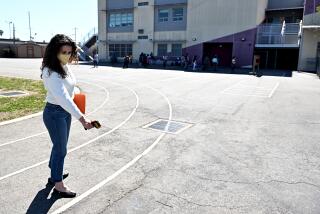Funds Again Sought for Long-Promised New High School : Education: Officials and parents step up bid to claim state bonds that were earmarked years ago to replace the run-down campus.
- Share via
LYNWOOD — School administrators and parents will travel to Sacramento this month to make a last-ditch bid for funds to build a long-awaited, long-promised Lynwood high school.
If they fail, state funding could be delayed at least two years for a $95-million project that administrators said is desperately needed to ease overcrowding and replace an outdated, run-down high school.
State officials have tentatively deleted Lynwood’s new high school from projects that will be funded by recently approved school construction bonds. The board has not distributed all the bond money, however, and Lynwood school officials will argue that their students have suffered from inadequate facilities long enough.
The Lynwood Unified School District will make its case April 28 before the State Allocation Board, which dispenses money for school construction projects. The district delegation is expected to include Supt. Audrey Clarke, parents, school board members, Lynwood city officials and local state legislators.
“We’ve been waiting our turn, trying to play by the rules,” said school board member Rachel Chavez. “I think we deserve a chance at money that was promised long ago.”
The patchwork campus, built in 1940 to hold 1,500 students, must accommodate about 3,200. The chemistry lab is antiquated. There is no foreign language lab. The students in only one honors math class have computers.
Many classrooms lack air conditioning. The gymnasium is warmed by portable propane heaters. Principal Mickey Cureton posts bulletins by hand because the school lacks a public address system.
Students have no place to eat indoors, and the cramped serving facilities for lunch create long, slow-moving lines.
The Lynwood school system has been trying to build a high school for at least 10 years. And until recently, the state was very encouraging about funding the project, officials said.
But groundbreaking was delayed for years by litigation over the proposed 33-acre site on Imperial Highway east of Bullis Road. The Seventh-day Adventist Church owned much of the property and contested the district’s right as a government entity to seize the site in exchange for a fair price.
In March, 1991, a court ruled in favor of the school district. The project was further stalled, however, when a jury did not set a price for the church land--$13.5 million--until last summer.
By then, requests for state school construction and renovation funds had multiplied while available money had evaporated. The state has a backlog of $4 billion in unfunded school construction projects.
The rising costs of Lynwood’s new school did not help matters. The district originally envisioned that $32 million--about a third of the current projection--would cover all costs, board member Richard Armstrong said. The district has exceeded its original construction estimate without even breaking ground, as a result of litigation, land acquisition and other expenses.
Because of the high cost, “when you talk to people in Sacramento about this, they look at you like you’re crazy,” Armstrong said.
The state has agreed to reimburse the district for such costs as litigation and land acquisition, but has not approved funds for construction, estimated at $50 million.
Lynwood will have to wait in line for construction money behind other projects, state officials told the district.
Part of the reason is that the district did not submit architectural drawings in time to get a share of $2 billion of school construction bonds, said Bruce Hancock, a state administrator for school funding applications. The state must approve construction plans before releasing money to build a school.
School officials blamed the delay in submitting plans on the persisting litigation and district funding shortages. The district had to struggle to pay for the drawings, board member Chavez said. Architects’ fees alone will total at least $1.8 million, according to the state.
Lynwood Unified finally submitted architectural drawings to the state in late October. Reviewing and approving a project of that magnitude usually takes at least six months, Hancock said. The plans are awaiting final state approval.
In the meantime, nearly all school bond proceeds have been awarded to other projects. To make matters worse, state officials no longer consider Lynwood’s new high school a highest-priority project. Preference is given to those districts that can afford to fund half of their construction costs.
This matching requirement was never part of the original proposal to build the new high school. Lynwood Unified, a financially struggling school system of about 15,000 students, could not afford to foot half the bill, district officials said.
“The state keeps changing the rules on us and it’s not fair,” Clarke said.
The state began asking school districts to match construction funding in 1990 to help pay for more projects, said the state’s Hancock.
The seven-member State Allocation Board has the authority to approve Lynwood’s bid, but would have to override its own policies to do so, he added.
Lynwood will probably have to wait until the next statewide school bond issue, Hancock said. A bond measure would not be on the ballot until June, 1994, at the earliest. If voters approve it, the money could take more than a year to filter down to local districts. Even then, Lynwood Unified would have no guarantee of state funding.
As a result, current high school students probably will continue to endure overcrowded classrooms and a field of trailers and portable buildings.
“These kids need a high school,” board member Armstrong said. “We’ve been at the table 10 years on this thing. I think we’re entitled.”
More to Read
Sign up for Essential California
The most important California stories and recommendations in your inbox every morning.
You may occasionally receive promotional content from the Los Angeles Times.














